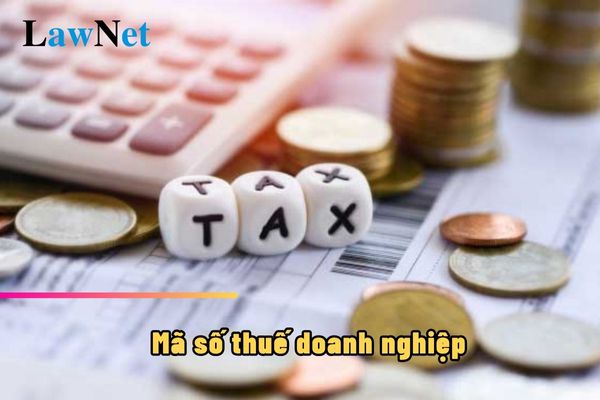What is the definition of TIN of an enterprise in Vietnam?
What is the definition of TIN of an enterprise in Vietnam?
Under the provisions of Article 29 of the Law on Enterprises 2020 regarding the enterprise identification number as follows:
Enterprise identification (EID) number
1. EID number is a serial number generated by the National Enterprise Registration Information System, issued to the enterprise when it is created and written on the Certificate of Enterprise Registration. Each enterprise shall have a sole EID number, which must not be issued to any other enterprise.
2. The EID number shall be used for paying taxes, following administrative procedures, exercising and performing other rights and obligations.
Thus, according to this regulation, the TIN of an enterprise is also the number issued upon enterprise registration.
The enterprise identification number shall be used for paying taxes, following administrative procedures, exercising and performing other rights and obligations.
Additionally, the EID number is a serial number generated by the National Enterprise Registration Information System, issued to the enterprise when it is created and written on the Certificate of Enterprise Registration.

What is the definition of enterprise identification number in Vietnam? (Image from the Internet)
What is the structure of the enterprise identification number in Vietnam?
As mentioned above, the enterprise identification number is also the TIN of the enterprise.
Therefore, under Article 5 of Circular 105/2020/TT-BTC, TINs of enterprises are classified into 02 forms :
- 10-digit TINs shall be issued to enterprises, cooperatives, entities that have full legal status or entities without legal status but incurring tax liabilities; representatives of households, household businesses and other individuals (hereinafter referred to as independent entities).
- 13-digit TINs with a dash (-) used to separate the first 10 digits and the last 3 digits are used for affiliated entities and others.
Additionally, according to Clause 1, Article 8 of Decree 01/2021/ND-CP:
Enterprise ID number, ID numbers of affiliates and business locations of enterprises
1. Each enterprise is issued with a single enterprise ID number. This number is also the enterprise’s taxpayer identification number (TIN) and social insurance participant’s code.
2. The enterprise ID number exists throughout its operation and shall not be issued to any other entity. When an enterprise ceases to operate, the enterprise ID number will be invalidated.
3. Enterprise ID numbers are created, sent and received automatically by the National Enterprise Registration Information System, tax registration information system, and written on enterprise registration certificates.
4. Regulatory agencies shall uniformly use enterprise ID numbers to perform state management tasks and exchange information about enterprises.
5. ID numbers of an enterprise’s affiliates are issued to the enterprise’s branches and representative offices. These numbers are also TINs of branches and representative offices.
6. ID number of a business location is a series of 5 digits from 00001 to 99999. This number is not TIN of the business location.
7. In case the TIN of the enterprise, or its branch or representative office is invalidated as a result of its commission of tax offences, this TIN must not be used in business transactions from the day on which the TIN invalidation is announced by the tax authority.
8. With regard to branches and representative offices that are established before November 01, 2015 but have not had their own ID numbers, the enterprise shall directly contact the tax authority to be issued with a 13-digit TIN, and then follow procedures for change of the registration information at the business registration authority as prescribed.
9. Enterprise ID numbers of enterprises that are established and operating under the investment license or investment certificate (also the business registration certificate) or another document of equivalent validity, or securities trading license shall be their TINs issued by tax authorities.
Thus, according to the regulation on the enterprise identification number, each enterprise is issued with a single enterprise ID number. This number is also the enterprise’s taxpayer identification number (TIN) and social insurance participant’s code.
What are the regulations on CIT payers in Vietnam?
According to Article 2 of the Corporate Income Tax Law 2008 (amended and supplemented by Clause 1, Article 1 of the Law on Amendments to the Corporate Income Tax Law 2013), the CIT payers are stipulated as follows:
- Taxpayers are goods and service production and business organizations which have taxable incomes under the provisions of this Law (below referred to as enterprises), including:
+ Enterprises established under Vietnamese law;
+ Enterprises established under foreign laws (below referred to as foreign enterprises) with or without Vietnam-based permanent establishments;
+ Organizations established under the Law on Cooperatives;
+ Public service providers established under Vietnamese law;
+ Other organizations engaged in income-generating production and business activities.
- Enterprises having taxable incomes under Article 3 of this Law shall pay corporate income tax as follows:
+ Enterprises established under Vietnamese law shall pay tax on taxable incomes generated in and outside Vietnam;
+ Foreign enterprises with Vietnam-based permanent establishments shall pay tax on taxable incomes generated in Vietnam and taxable incomes generated outside Vietnam which are related to the operation of such establishments;
+ Foreign enterprises with Vietnam-based permanent establishments shall pay tax on taxable incomes generated in Vietnam which are not related to the operation of such permanent establishments.
+ Foreign enterprises without Vietnam-based permanent establishments shall pay tax on taxable incomes generated in Vietnam.
- The permanent establishments of a foreign enterprise are the places through which the foreign enterprise carries out part or the whole business in Vietnam, including:
+ Branches, executive offices, factories, workshops, means of transport, oil fields, gas files, miles or other natural resource extraction sites in Vietnam;
+ Construction sites;
+ Service providing centers, including counseling services via employees or other organizations or individuals;
+ Agents of foreign enterprises;
+ Representatives in Vietnam that are competent to sign contracts under the name of the foreign enterprise or that are not competent to sign contracts under the name of the enterprise but regularly provide goods or services in Vietnam.

